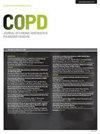MTOR Suppresses Cigarette Smoke-Induced Airway Inflammation and MMP12 Expression in Macrophage in Chronic Obstructive Pulmonary Disease
IF 3.1
3区 医学
Q1 Medicine
International Journal of Chronic Obstructive Pulmonary Disease
Pub Date : 2024-01-23
DOI:10.2147/copd.s426333
引用次数: 0
Abstract
Background: Macrophage-derived matrix metalloproteinase 12 (MMP12) can cause destruction of lung tissue structure and plays a significant role in the development and progression of chronic obstructive pulmonary disease (COPD). MTOR is a serine/threonine kinase that plays a crucial role in cell growth and metabolism. The activity of MTOR in the lung tissues of COPD patients also shows significant changes. However, it is unclear whether MTOR can regulate the development and progression of COPD by controlling MMP12. This study primarily investigates whether MTOR in macrophages can affect the expression of MMP12 and participate in the progression of COPD.Methods: We tested the changes in MTOR activity in macrophages exposed to cigarette smoke (CS) both in vivo and in vitro. Additionally, we observed the effect of MTOR on the expression of MMP12 in macrophages and on lung tissue inflammation and structural damage in mice, both in vivo and in vitro, using MTOR inhibitors or gene knockout mice. Finally, we combined inhibitor treatment with gene knockout to demonstrate that MTOR primarily mediates the expression of MMP12 through the NF-κB signaling pathway.
Results: Exposure to CS can enhance MTOR activity in mouse alveolar macrophages. Inhibiting the activity of MTOR or suppressing its expression leads to increased expression of MMP12. Myeloid-specific knockout of MTOR expression can promote the occurrence of CS-induced pulmonary inflammation and emphysema in mice. Inhibiting the activity of NF-κB can eliminate the effect of MTOR on MMP12.
Conclusion: Macrophage MTOR can reduce the expression of MMP12 by inhibiting NF-κB, thereby inhibiting the occurrence of COPD inflammation and destruction of lung tissue structure. Activating the activity of macrophage MTOR may be beneficial for the treatment of COPD.
MTOR 可抑制香烟烟雾诱发的气道炎症和慢性阻塞性肺病巨噬细胞中 MMP12 的表达
背景:巨噬细胞衍生的基质金属蛋白酶 12(MMP12)可导致肺组织结构破坏,并在慢性阻塞性肺病(COPD)的发生和发展过程中发挥重要作用。MTOR 是一种丝氨酸/苏氨酸激酶,在细胞生长和新陈代谢中起着至关重要的作用。慢性阻塞性肺病患者肺组织中 MTOR 的活性也发生了显著变化。然而,MTOR 是否能通过控制 MMP12 来调节慢性阻塞性肺病的发生和发展尚不清楚。本研究主要探讨巨噬细胞中的 MTOR 是否会影响 MMP12 的表达并参与 COPD 的进展:我们检测了暴露于香烟烟雾(CS)的巨噬细胞体内和体外 MTOR 活性的变化。此外,我们还利用 MTOR 抑制剂或基因敲除小鼠,在体内和体外观察了 MTOR 对巨噬细胞中 MMP12 的表达以及对小鼠肺组织炎症和结构损伤的影响。最后,我们将抑制剂处理与基因敲除相结合,证明MTOR主要通过NF-κB信号通路介导MMP12的表达:结果:暴露于 CS 可增强小鼠肺泡巨噬细胞中 MTOR 的活性。抑制 MTOR 的活性或抑制其表达会导致 MMP12 的表达增加。骨髓特异性敲除 MTOR 的表达可促进 CS 诱导的小鼠肺部炎症和肺气肿的发生。抑制NF-κB的活性可消除MTOR对MMP12的影响:结论:巨噬细胞 MTOR 可通过抑制 NF-κB 减少 MMP12 的表达,从而抑制 COPD 炎症的发生和肺组织结构的破坏。激活巨噬细胞MTOR的活性可能有利于慢性阻塞性肺病的治疗。
本文章由计算机程序翻译,如有差异,请以英文原文为准。
求助全文
约1分钟内获得全文
求助全文
来源期刊

International Journal of Chronic Obstructive Pulmonary Disease
RESPIRATORY SYSTEM-
CiteScore
5.10
自引率
10.70%
发文量
372
审稿时长
16 weeks
期刊介绍:
An international, peer-reviewed journal of therapeutics and pharmacology focusing on concise rapid reporting of clinical studies and reviews in COPD. Special focus will be given to the pathophysiological processes underlying the disease, intervention programs, patient focused education, and self management protocols. This journal is directed at specialists and healthcare professionals
 求助内容:
求助内容: 应助结果提醒方式:
应助结果提醒方式:


